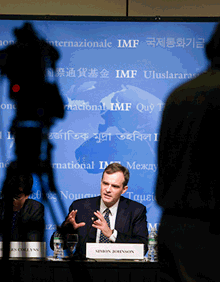
Typical street scene in Santa Ana, El Salvador. (Photo: iStock)
IMF Survey: IMF Gloomy on Growth, Sees Rising Inflation Threat
July 17, 2008
- Global economic growth to slow significantly in second half of 2008
- Rising energy, commodity prices have boosted inflationary pressure
- Need to adapt to shift in purchasing power from commodity users to producers
The IMF expects global growth to slow significantly in the second half of the year, before recovering gradually in 2009.

Food market in Bangkok, Thailand: IMF has raised its inflation forecasts for emerging and developing economies (photo: Stuart Westmorland/Corbis)
UPDATED WORLD ECONOMIC OUTLOOK
Updated forecasts in the IMF's World Economic Outlook (WEO), released July 17, also raise inflation projections, particularly for emerging markets and developing countries.
The WEO expects a moderation in global growth from 5 percent in 2007 to 4.1 percent in 2008 and 3.9 percent in 2009. Following a better-than-expected performance in the early part of 2008, WEO projections for the United States, the euro area, and Japan show a slowdown in activity in the second half of 2008.
Expansions in emerging and developing economies are also expected to lose further steam, with growth in these countries projected to ease to around 7 percent in 2008-09 from 8 percent in 2007. China's growth rate is expected to ease from near 12 percent in 2007 to around 10 percent in 2008-09.
"The global economy is in a tough spot, caught between sharply slowing demand in many advanced economies and rising inflation everywhere, notably in emerging and developing economies," the WEO says.
Rising inflationary pressures
At the same time as the growth slowdown, the WEO notes, rising energy and commodity prices have boosted inflationary pressure, particularly in emerging and developing economies. In advanced economies, inflation pressures are likely to be countered by slowing demand and, with commodity prices projected to stabilize, the expected increase in inflation for 2008 is forecast to be reversed in 2009.
In emerging and developing countries, inflationary pressures are mounting faster, fueled by soaring commodity prices, above-trend growth, and accommodative macroeconomic policies. Hence, inflation forecasts for these economies have been raised by more than 1.5 percentage points in both 2008 and 2009, to 9.1 percent and 7.4 percent, respectively, and the moderation in inflation in 2009 will depend on more assertive tightening of monetary conditions.
At the July 9 summit of leaders of the Group of Eight industrial countries in Hokkaido, Japan, IMF Managing Director Dominique Strauss-Kahn said inflation should be the top concern of policymakers confronted by higher food and fuel prices. Strauss-Kahn called on leaders to act to prevent higher food and fuel prices turning into generalized inflation
Slowing demand
"In the recent past, the global economy has managed to take large shocks in stride, but we think its capacity to absorb them is being increasingly challenged," IMF Chief Economist Simon Johnson told a July 17 press briefing in Washington. "How it will navigate through the latest turbulence in financial and commodity markets will crucially depend on how successfully policymakers respond to a fast-changing set of risks in many advanced and emerging economies."

IMF's Johnson at WEO press briefing: global economy's capacity to absorb large shocks is being increasingly challenged (IMF photo)
The WEO says the top priority for policymakers is to head off rising inflationary pressure while keeping sight of risks to growth. In many emerging economies, tighter monetary policy and greater fiscal restraint are required, combined in some cases with more flexible exchange rate management."
In the major advanced economies, the case for monetary tightening is seen as less compelling, given that inflation expectations and labor costs are projected to remain well anchored while growth is weakening, but inflation pressures need to be monitored.
Shift in purchasing power
The WEO notes that purchasing power in commodity-importing economies has been eroded. Credit conditions in advanced economies are expected to remain tight in the coming quarters, with banks gradually repairing their balance sheets but facing additional losses from weakening credit performance in the context of slowing economies.
Risks to the global growth outlook are seen by the WEO as balanced. Demand in advanced and emerging economies might be more resilient than projected to recent commodity price and financial shocks, as was the case during the first quarter of 2008. However, financial markets remain fragile and inflation is a rising concern.
The risk of second-round effects from the surge in commodity prices complicates policymakers' response to the slowdown, particularly in advanced economies, while in emerging economies stronger action is likely to be needed to cool activity and reverse rising inflation momentum. Additional oil and food price shocks would exacerbate inflation concerns, while further weakening consumption in importing countries.
Comments on this article should be sent to imfsurvey@imf.org







